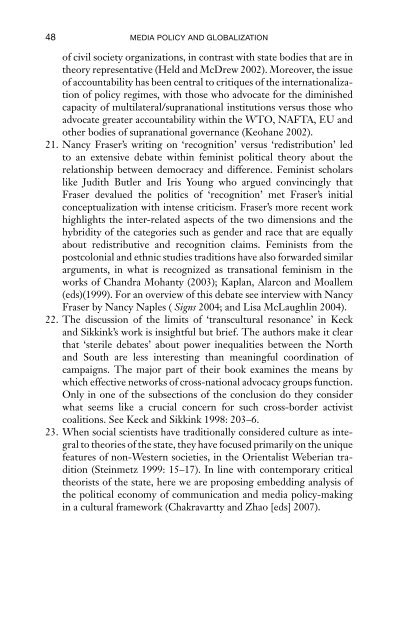Media Policy and Globalization - Blogs Unpad
Media Policy and Globalization - Blogs Unpad
Media Policy and Globalization - Blogs Unpad
Create successful ePaper yourself
Turn your PDF publications into a flip-book with our unique Google optimized e-Paper software.
48 MEDIA POLICY AND GLOBALIZATION<br />
of civil society organizations, in contrast with state bodies that are in<br />
theory representative (Held <strong>and</strong> McDrew 2002). Moreover, the issue<br />
of accountability has been central to critiques of the internationalization<br />
of policy regimes, with those who advocate for the diminished<br />
capacity of multilateral/supranational institutions versus those who<br />
advocate greater accountability within the WTO, NAFTA, EU <strong>and</strong><br />
other bodies of supranational governance (Keohane 2002).<br />
21. Nancy Fraser’s writing on ‘recognition’ versus ‘redistribution’ led<br />
to an extensive debate within feminist political theory about the<br />
relationship between democracy <strong>and</strong> difference. Feminist scholars<br />
like Judith Butler <strong>and</strong> Iris Young who argued convincingly that<br />
Fraser devalued the politics of ‘recognition’ met Fraser’s initial<br />
conceptualization with intense criticism. Fraser’s more recent work<br />
highlights the inter-related aspects of the two dimensions <strong>and</strong> the<br />
hybridity of the categories such as gender <strong>and</strong> race that are equally<br />
about redistributive <strong>and</strong> recognition claims. Feminists from the<br />
postcolonial <strong>and</strong> ethnic studies traditions have also forwarded similar<br />
arguments, in what is recognized as transational feminism in the<br />
works of Ch<strong>and</strong>ra Mohanty (2003); Kaplan, Alarcon <strong>and</strong> Moallem<br />
(eds)(1999). For an overview of this debate see interview with Nancy<br />
Fraser by Nancy Naples ( Signs 2004; <strong>and</strong> Lisa McLaughlin 2004).<br />
22. The discussion of the limits of ‘transcultural resonance’ in Keck<br />
<strong>and</strong> Sikkink’s work is insightful but brief. The authors make it clear<br />
that ‘sterile debates’ about power inequalities between the North<br />
<strong>and</strong> South are less interesting than meaningful coordination of<br />
campaigns. The major part of their book examines the means by<br />
which effective networks of cross-national advocacy groups function.<br />
Only in one of the subsections of the conclusion do they consider<br />
what seems like a crucial concern for such cross-border activist<br />
coalitions. See Keck <strong>and</strong> Sikkink 1998: 203–6.<br />
23. When social scientists have traditionally considered culture as integral<br />
to theories of the state, they have focused primarily on the unique<br />
features of non-Western societies, in the Orientalist Weberian tradition<br />
(Steinmetz 1999: 15–17). In line with contemporary critical<br />
theorists of the state, here we are proposing embedding analysis of<br />
the political economy of communication <strong>and</strong> media policy-making<br />
in a cultural framework (Chakravartty <strong>and</strong> Zhao [eds] 2007).

















